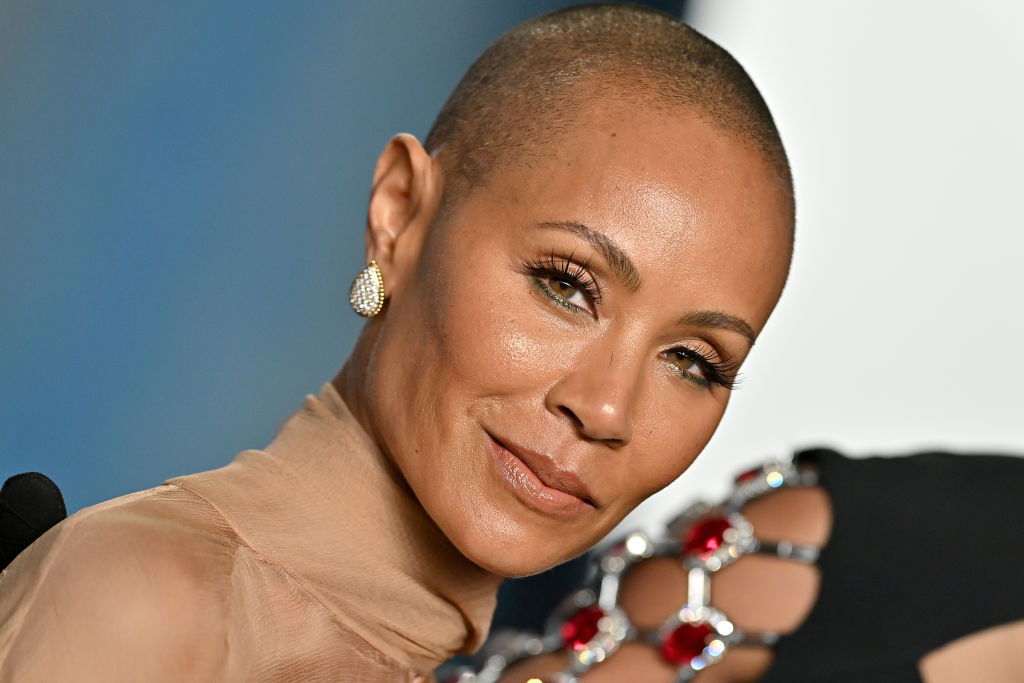How Does Alopecia Affect Black Women?

Source: Axelle/Bauer-Griffin / Getty
Chris Rock’s questionable G.I. Jane 2 joke about Jada Pinkett Smith’s shaved head sent the internet into an uproar during The Oscars on March 27. We’re not sure what’s more embarrassing. The fact that Will Smith had to lay the smackdown on Chris Rock live on air for insulting his wife, or the sheer humiliation that Pinkett Smith must have felt having her condition with Alopecia made fun of in front of Oscar attendees and millions of viewers at home. We’re sure Rock’s insensitive remark was no laughing matter to the 6.8 million people who are affected by Alopecia nationwide, but the joke certainly brought attention to the growing issue. Many fans online weren’t familiar with the hair loss condition until Sunday’s award ceremony, so what is Alopecia exactly and how does it affect Black women?
Alopecia or Alopecia areata is a common autoimmune skin disease, caused by hair loss on the scalp, face, and sometimes on other areas of the body, and it’s been linked to depression and anxiety in some people, according to Dr. Sanam Hafeez, an NYC-based Neuropsychologist who studies the impact of Alopecia on people’s psyche. The condition can have a severe impact on a person’s self-confidence, appearance, and overall lifestyle.
Stars like Jada Pinkett Smith and Rep. Ayanna Pressley have been open about their hair loss battles
Jada Pinkett Smith and Massachusetts’s Rep. Ayanna Pressley have been open about their personal struggles with Alopecia.
The Matrix actress first revealed her battle with the skin condition in 2018 during an episode of Red Table Talk, which she hosts alongside her daughter Willow Smith and mother Adrienne Banfield-Norris.
“It really settled me,” she added.
“#Alopecia nation stand up! Thank you #WillSmith Shout out to all the husbands who defend their wives living with alopecia in the face of daily ignorance & insults,” the Massachusetts Democrat tweeted and deleted. On Monday, Pressley, who went public with her Alopecia struggles in a 2020 video confessional, doubled down on her stance.
“My life’s work has always been about trauma & healing. I’m a survivor – I don’t endorse violence in any form, “she clarified before hitting send on another tweet alongside her husband that read:“Let’s talk about what it’s like to live with #alopecia. The deeply vulnerable & difficult moments that our families see. Appreciation post for those who hold us down & support us when we’re at our lowest points. They see us, fully,” she continued. “Our bodies are not public domain. They are not a line in a joke—especially when the transformation is not of our choosing. I’m a survivor of violence. I’m a proud Alopecian. The psychological toll we carry daily is real. Team Jada always. That’s that on that,” she added.
Pressley opened up about her Alopecia battle in 2020 during an emotional conversation with The Root.The lawmaker recalled the devastating experience of when she started “waking up every morning to sink fulls of hair,” despite doing everything she could to prevent the condition from worsening.
“I did not want to go to sleep because I did not want the morning to come,” she said while reliving the moment she looked in the mirror and saw “a person who increasingly looked like a stranger.”
There are many forms of Alopecia
Many types of Alopecia can impact an individual’s hair follicles. According to the Mayo Clinic, Telogen effluvium is a form of hair loss in women that can develop when the body is put through extreme stress, such as childbirth, malnutrition, or major surgery. There’s also Alopecia Totalis, another form of skin disease that causes an individual to lose all of the hair on their scalp, while Patchy alopecia areata causes hair loss in coin-sized patches. Individuals who suffer from Alopecia Universalis tend to lose all of the hair on their scalp, face, and body, according to The National Alopecia Areata Foundation (NAAF).
Trichotillomania is an irresistible urge to pull out hair from your scalp, eyebrows, or other areas of your body. Hair pulling can be a way of dealing with negative or uncomfortable feelings, such as stress, tension, loneliness, boredom, or frustration, which can result in long-term hair loss, Web MD notes.
What causes the condition? Is Their A Cure?
Many complicated factors contribute to Alopecia and its aggressiveness in certain individuals. Scientists are still researching what causes the immune system to attack healthy hair follicles, and they aren’t quite sure if the condition occurs inside or outside of the body. Currently, there are two theories; according to the NAAF, some researchers believe the trigger could arise from a virus or a type of bacteria that enters the body. Others believe environmental conditions can bring on Alopecia.
There is no cure for alopecia areata, but luckily, the hair follicles in a person experiencing the condition remain alive, even when the disease is “active” in the body. “This means that your hair can grow back again — even after a long period of time and even if you have more than 50% hair loss,” the organization adds.
Alopecia Is More Common Among Black People
, after reviewing more than 11,000 individuals in a case study.
SEE ALSO:
My Black Heroes Let Me Down At The Oscars And I Feel A Way



